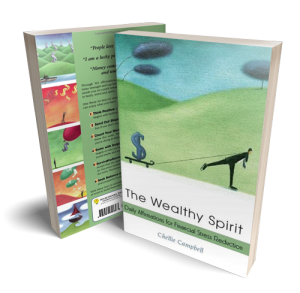328 – November 24
“Gold, like the sun, which melts wax and hardens clay, expands great souls and contracts bad hearts.”—Antoine de Rivaroli
Studies have shown that, once above subsistence level, having more money and material success won’t make you any happier. You already have to be happy. If you haven’t learned how to be a happy person, how to take pleasure in the daily gifts the world offers to all of us, material goods will not satisfy you. Everyone can point to rich people who are lonely, bored, angry, or depressed. Having money just made them comfortable in their misery. The single-minded pursuit of money can distract them from their despair for awhile, but in the end, if they are curled up in their castle alone with no friends, all their millions will be cold comfort.
Some people are afraid to have a lot of money, because they think the money will make them selfish, uncaring, lonely, and miserable. But money doesn’t do that. It’s what is done with the money that is either good or evil. If you would do evil if you had money, then you are evil now—just without power. Money does provide power. The more money you have, the more you can manifest your material desires. The downside is that one can get distracted by all the material manifestations and neglect the spiritual ones. But of course, being poor can keep you focused on the lack of material success, and that can keep you from manifesting your spiritual desires.
So what is the answer? Learn to live rich, inside and out. There is joy in both internal wealth and external wealth. Focus on joy, happiness, your relationship with God, your relationships with other people, the meaning of life, and the mission of your life. Rich or poor, you can meditate and pray and make these your priorities. When you are joyful and grateful for what you have, you create the space for more. When you sense that there is a purpose to life and a mission within it for you to fulfill, then you act in harmony with God and the Universe. Open yourself to manifesting abundance in all areas of life, including financial success, knowing that you will use them honorably and with wisdom for the good of all around you.
Today’s Affirmation:
“I live richly and happily—inside and out!”
An article in the LATimes by Amina Khan stated that “Happiness May Make You More Money”. ( Hah. I’ve been saying that all along!)
“Scientists may have discovered the secret to avoiding the fiscal cliff: Happiness. Regardless of whether money can buy happiness, being happy may actually make you more money down the road, new research finds,” she writes.
“People who express more positive emotions as teenagers and greater life satisfaction as young adults tend to have higher incomes by the time they’re 29, according to a study published Monday by the Proceedings of the National Academy of Sciences.
“The difference was so great that when measuring life satisfaction on a 5-point scale, a 1-point jump at age 22 made a $2,000 difference in income down the line. Between the gloomiest and the happiest brackets, that amounts to an $8,000 earnings swing.”
Studies found that, across the board, no matter what their other circumstances were, happier people earned bigger paychecks. People who were very unhappy generated incomes that were 30% lower than average.
“The findings suggest that interventions to encourage more positive thinking in kids and teens could greatly improve their future success,” said Michael Norton, a behavioral scientist at Harvard Business School who was not involved in the study.
Isn’t that great? I love it that the psychology profession is now studying happiness, whereas for most of its existence it has only studied dysfunction.
Khan noted that economics professor Andrew Oswald of the University of Warwick in England has suggested that low unemployment makes people happier than low inflation. Perhaps if governments focused on stimulating job growth, even if those measures boosted inflation, they would lead to greater happiness — and thus more prosperity overall, De Neve mused.
A little individual happiness, spread over entire populations, could have a massive combined effect, perhaps pulling depressed economies out of their slumps.
“Even the fiscal cliff could be averted that way,” De Neve said. Then he laughed. “I’m just kidding. Who knows? Maybe.”



